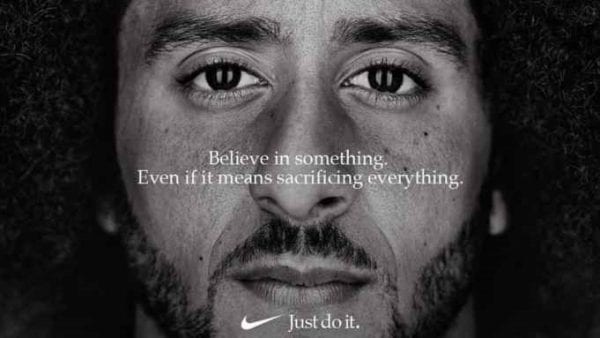Nadine Wallis
Nadine Wallis is a copywriter at Pure SEO. When she isn’t writing, Nadine can be found reading fiction (surprise) and enjoying outdoor adventures. She has a Marketing and Communication Studies conjoint degree from AUT.

Public outcry grew quickly as news broke about Georgia’s voting law upheaval earlier this year, and many major American corporations grabbed headlines by joining the fray. Several companies were quick to condemn the passing of the bill, though some key players remained on the sidelines rather than try their hand at brand activism. This begs the question: Do companies have an obligation to weigh in on socio-political issues? And furthermore, does it affect their profitability? If so, how?
Brand activism grew out of the practice of corporate social responsibility; the idea that companies should do what they can to better society and play a positive role in their communities. Classic corporate responsibility is generally apolitical, cultivating an image of an engaged organization, outwardly supportive of non-controversial groups and causes.
Brand activism has proven more divisive, however, as corporations have courted controversy in recent years over issues that may not even be directly related to the business itself. Heavily politicized societal issues are precarious terrain for businesses, and they are made all the more difficult by increasing social pressure to take a side. Standing up and endorsing one view can alienate a whole group of people, who may include the company’s target market or key investors. This is where navigating brand activism becomes so challenging.
Research in this area is growing and points to the fact that consumers do expect businesses to speak out on societal problems. The 2021 Edelman Trust Barometer study shows that 86% of consumers expect CEOs to address societal challenges. They don’t just want a statement, either. The majority of consumers expect CEOs to actively support societal issues that the government doesn’t address, believing that CEO’s should take the lead rather than waiting for government direction.
Consumers placing value on a company’s social positions can have a real impact on business outcomes. According to the Edelman Earned Brand Study, 64% of consumers worldwide now make purchase decisions based on beliefs. These belief-driven buyers will either buy, boycott, or switch brands based on the company’s stance on societal issues.
And this doesn’t just apply to young, trendy consumers. The study shows that belief-driven buyers make up a majority in all large markets worldwide, across all age groups, and even all income levels. Therefore, the way a company addresses social issues can have a big impact on business outcomes, either by attracting a wider range of customers or alienating their key market.
Just because consumers want brands to speak out on social issues doesn’t mean all companies should, at least not without careful consideration. Authenticity is the primary factor. Whether it’s a CEO statement or a large-scale campaign crafted by a digital marketing agency, authenticity in the message is paramount.
Let’s take a look at some successful and failed attempts at brand activism to show the importance of taking authentic action.

One of the most famous examples of brand activism from recent years is Nike’s “Dream Crazy” campaign, which featured NFL player Colin Kaepernick and referenced his protest against police brutality by kneeling during the national anthem. While the campaign did cause controversy, the adverts got the authenticity factor right, and it paid off in terms of financial gain. Nike’s market value rose by $6 billion, with shares up 36% during 2018 when the campaign took place.
This highlights the importance of connecting social issues with a brand in a meaningful, logical, and authentic way. It made sense for Nike to advocate for the Black Lives Matter movement through the Colin Kaepernick ad, as their brand purpose is based on empowering and supporting athletes. It was also delivered with sensitivity and the right tone.

On the other hand, Pepsi’s 2017 commercial referencing the Black Lives Matter movement endured widespread public backlash and was almost immediately pulled from the airwaves. The ad showed model Kendall Jenner at a protest of unknown intent, where she uses a can of Pepsi to dispel tension between protestors and police.
This campaign is considered a prime example of missing the mark in terms of communicating a genuine message relating to a social issue. Rather than doing anything to help the movement, Pepsi was perceived to have trivialized it. The ridicule on social media that the campaign received shows that jumping on the bandwagon with a social issue is not a good look. “Woke-washing” is seldom tolerated by the public and likely won’t improve company image or revenue.
Gillette waded into controversy with their marketing campaign responding to the #MeToo movement in 2019, which they used to debut a new tag line, “The Best Men Can Be”. The ad depicts scenes of negative male behavior such as sexual harassment and bullying, before these actions are stopped by other men later in the piece.
This bold move of addressing such a challenging issue did not work in Gillette’s favor. The ad was met at first with equal parts praise and criticism, but later studies showed that Gillette’s brand perception declined in the wake of the ad. The original YouTube video currently has 1.6 million dislikes.
Despite a well executed piece of advertising, and a realitively straightfoward and safe message, the takeaway for most men was that Gillette harbored disdain for their target market. This caused damage to the brand, and makes “The Best Men Can Be” a cautionary tale about the risk of charged social messaging. Even a message as simple and seemingly agreeable as “we should be nicer to each other” can be off-putting to some customers.
It may seem safer to simply avoid speaking about or acting on controversial issues to avoid backlash, but even this can lead to negative consequences. In 2017, over 200,00 Uber users deleted the app to protest the company’s inaction over Trump’s immigration ban. While the New York Taxi Alliance halted its services to JFK Airport in protest over the ban, Uber instead ignored protestors’ calls to stop servicing the airport and reduced their prices in the area by turning off surge pricing.
Weighing in on social issues is increasingly expected by engaged consumers, and not speaking up at all is starting to bring its own risks including boycotts and losing customer loyalty. However, speaking up in an inauthentic way can have serious risks. Therefore, companies should proceed with caution, and analyse the social issue against their own company beliefs.
Can a company back up its claims with actions? Are their affairs in order regarding the issue, or will they be seen as hypocritical? Will making a stand on this issue alienate a key group of customers or investors? Can they speak on the issue eloquently, and are they educated enough on the issue to do so? These are all questions to consider before taking any action, and there is no one-size-fits-all approach. When done right, there is much to gain from brand activism, but when approached in the wrong way, it can lead to a nasty fall.

